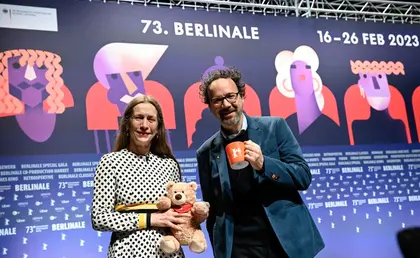The Berlin film festival, Europe's first major cinema showcase of the year, opens on Thursday, Feb. 16, with a focus on the fight for freedom in Ukraine and Iran and the starriest line-up since the pandemic.
The 73rd Berlinale, traditionally the most politically minded of the big three European festivals, will coincide with the first anniversary of the start of the Russian invasion.
JOIN US ON TELEGRAM
Follow our coverage of the war on the @Kyivpost_official.
The event will screen nine new movies, primarily documentaries, about Ukrainian life in wartime, including Sean Penn's "Superpower", shot by the two-time Oscar winner in Kyiv last February.
Iran's embattled independent filmmakers will also take center stage with a series of premieres and panel discussions looking at the country, which has been rocked by rights protests since September.
Artistic director Carlo Chatrian said the 11-day festival was "standing shoulder to shoulder with those who fight to express their ideas".
He promised films that "tell the story of the world with all its wounds as well as its heartbreaking beauty".
- Spielberg, Mirren, Krieps -
French-Iranian actor Golshifteh Farahani ("Paterson") will serve on the jury for the Golden and Silver Bear top prizes headed by Hollywood star Kristen Stewart, at 32 the youngest president in the festival's history.
Nineteen films from around the world will vie for the main awards, including "Manodrome" starring Jesse Eisenberg and Adrien Brody, billed as a thriller about masculinity in crisis.

‘If They Cut, I Think We Will Lose’ – Ukraine at War Update for Nov. 20
The European bureau chief of The Hollywood Reporter, Scott Roxborough, told AFP that after several editions marred by the coronavirus outbreak, the Berlinale was back with "big star power" and "gala red carpet bonanzas".
Three-time Academy Award winner Steven Spielberg is due in the German capital to collect an honorary Golden Bear for his life's work, spotlighted in a retrospective.
British actor Helen Mirren will premiere the keenly awaited "Golda" in which she stars as Israel's only female prime minister, Golda Meir.
And Vicky Krieps, the acclaimed Luxembourg-born actor who made her breakthrough opposite Daniel Day-Lewis in "Phantom Thread", will unveil her turn as renowned Austrian writer Ingeborg Bachmann in a biopic by veteran German director Margarethe von Trotta.
Von Trotta "will be adding to her list of phenomenal feminist figures of the last two centuries", after acclaimed dramas about icons such as philosopher Hannah Arendt and revolutionary Rosa Luxemburg, Roxborough said.
- 'Explosion of manga' -
The Berlinale has a stronger track record than Cannes or Venice for including female directors, who make up about 40 percent of participants at this year's Berlinale.
The opening night film will be Rebecca Miller's "She Came to Me", a romantic comedy about a composer fighting writer's block, starring Peter Dinklage of "Game of Thrones", Anne Hathaway and Marisa Tomei.
John Malkovich will present "Seneca –- On the Creation of Earthquakes", a surreal take on the mentor of the tyrant Nero in Ancient Rome.
And "Boom! Boom! The World vs. Boris Becker" -- a look at the travails of the German tennis champion by award-winning US documentarian Alex Gibney -- will make its debut.
Roxborough noted that the Berlinale has a reputation for "finding new voices" and launching up-and-coming talents.
Berlin "is the place for discoveries because the selection committees are quite good at finding stuff overlooked by other festivals", he said.
Roxborough said he was looking forward to new movies by Brandon Cronenberg -- son of horror king David -- and Korean-Canadian director Celine Song, who caused a sensation at last month's Sundance film festival with her semi-autobiographical drama "Past Lives".
And he predicted that animated fantasy feature "Suzume" by Makoto Shinkai -- already a blockbuster in Japan -- could be "the biggest film to come out of Berlin this year" amid a global boom in Japanese anime.
You can also highlight the text and press Ctrl + Enter






